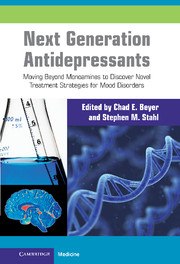 Next Generation Antidepressants
Next Generation Antidepressants Book contents
- Next Generation Antidepressants
- Next Generation Antidepressants
- Copyright page
- Contents
- Contributors
- Preface
- Abbreviations
- Chapter 1 Current depression landscape
- Chapter 2 Novel therapeutic targets for treating affective disorders
- Chapter 3 Developing novel animal models of depression
- Chapter 4 Translational research in mood disorders
- Chapter 5 Defining depression endophenotypes
- Chapter 6 Genetic and genomic studies of major depressive disorder
- Chapter 7 Medicinal chemistry challenges in the design of next generation antidepressants
- Chapter 8 Application of pharmacogenomics and personalized medicine for the care of depression
- Index
- References
Chapter 1 - Current depression landscape
a state of the field today
Published online by Cambridge University Press: 19 October 2021
- Next Generation Antidepressants
- Next Generation Antidepressants
- Copyright page
- Contents
- Contributors
- Preface
- Abbreviations
- Chapter 1 Current depression landscape
- Chapter 2 Novel therapeutic targets for treating affective disorders
- Chapter 3 Developing novel animal models of depression
- Chapter 4 Translational research in mood disorders
- Chapter 5 Defining depression endophenotypes
- Chapter 6 Genetic and genomic studies of major depressive disorder
- Chapter 7 Medicinal chemistry challenges in the design of next generation antidepressants
- Chapter 8 Application of pharmacogenomics and personalized medicine for the care of depression
- Index
- References
Summary
More than two dozen pharmacological treatments are currently available for depression, working by more than a half dozen mechanisms, yet there remain many unmet therapeutic needs. Available antidepressants act directly on monoamine mechanisms, influencing receptors and transporters for serotonin, norepinephrine, and/or dopamine. Truly novel therapeutic targets beyond the monoamines have not emerged in the past few decades. Advances have been mostly in improved tolerability, and as a result, limitations in efficacy persist for all agents in the antidepressant class. Specifically, far too few patients, perhaps only a third, attain a full remission of symptoms, and those who have had many episodes of depression are not likely to sustain any remission for more than a few months. Thus, there is the urgent need for antidepressants with improved efficacy. Although the “holy grail” of antidepressant treatment has long been rapid onset of action, the reality is that more robust and sustained efficacy, even if delayed, is the unmet need of today. This is unlikely to be met by targeting the same monoamine transporters and receptors where current antidepressants act, so novel therapeutic targets must be identified if there is to be novel therapeutic efficacy of more robust and sustained antidepressant action.
Other issues in the treatment of depression include the increasing confusion between unipolar and bipolar depression, particularly at onset of first depressive episodes, as well as the confusion between treatment-resistant unipolar depression versus difficult-to-treat rapid cycling, mixed episodes of bipolar depression. Treatments for bipolar depression such as anticonvulsants and atypical antipsychotics are increasingly being used for bipolar and treatment-resistant cases. Future therapeutics may usefully exploit these mechanisms, and treatment of difficult cases in the future will likely involve use of multiple simultaneous mechanisms, either with multiple drugs or with multifunctional drugs.
There is also concern that depression may be a progressive illness, with unipolar depression progressing to treatment-resistant depression or even to bipolar spectrum disorder, and bipolar disorder progressing to rapid cycling and mixed treatment-resistant bipolar episodes. Future treatments of depression may not only have the potential to treat current symptoms and prevent their relapse, but also to halt progression and thus be disease-modifying, altering the course of untreated or inadequately treated illness.
- Type
- Chapter
- Information
- Next Generation AntidepressantsMoving Beyond Monoamines to Discover Novel Treatment Strategies for Mood Disorders, pp. 1 - 11Publisher: Cambridge University PressPrint publication year: 2010
